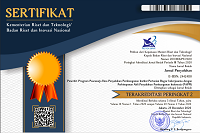Adopsi Teknologi Petani pada Sekolah Lapangan Pengelolaan Tanaman Terpadu (SL-PTT)
Abstract
Field School of Comprehensive Agriculture Land-Use Management (SL-PTT) is agriculture innovation from ministry of agriculture. The SL-PTT program aims accelerating the adoption of innovation at the farm level to increase production in a sustainable manner. The study aims to analyze decision making process by the farmers to adopt and utilize the technology of rice innovation in their land-use and and how much the production level of rice achieved by the farmers in SL-PTT program. The study was planned using survey descriptive correlational on March-April 2014 covered 80 farmers in village of Abbokongeng, Sub District of Kulo, District of Sidrap, South Sulawesi. Data were analyzed and tested using multiple linear regression. The evidence showed that almost all (91,25%) of the farmers applied all innovations, such as: using high qualified seeds, planting system, using appropriate fertilizer and water irrigarion, controlling pests, harvest and past-harvest management. Production of rice were more than 6,000 kg /ha with average profit is Rp 18,969,950/Ha. To increase adoption innovation of technology by the farmers, exntension worker should carry out more intensive approach. Communication between the farmers and the extension worker should be maintained and increased through the SL-PTT program in such that the rice production can be consistently increazed.
Keywords: Adoption, technology, farmer, extension worker, SL-PTT
Downloads
Authors who publish with this journal agree to the following terms:
- Authors retain copyright and grant the journal right of first publication with the work simultaneously licensed under a

This work is licensed under a Creative Commons Attribution 4.0 International License that allows others to share the work with an acknowledgement of the work's authorship and initial publication in this journal. - Authors are able to enter into separate, additional contractual arrangements for the non-exclusive distribution of the journal's published version of the work (e.g., post it to an institutional repository or publish it in a book), with an acknowledgement of its initial publication in this journal.
- Authors are permitted and encouraged to post their work online (e.g., in institutional repositories or on their website) prior to and during the submission process, as it can lead to productive exchanges, as well as earlier and greater citation of published work (See The Effect of Open Access).















